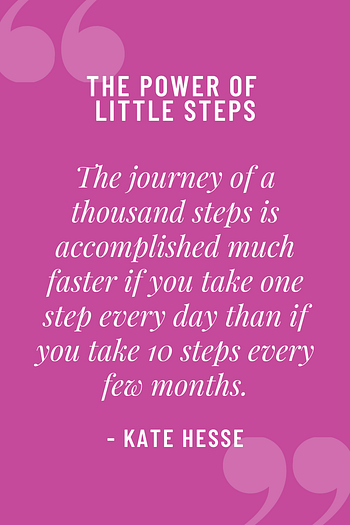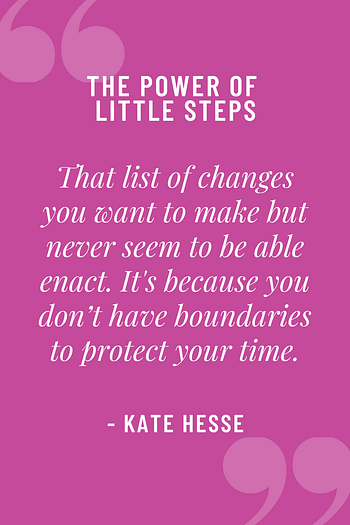
Often, by the time we realize our lives are out of balance, things have gotten so far out of alignment that we need to make course corrections in a number of different areas of our lives.
 We don’t just need to eat healthier, we also need to get more exercise. Maybe we’re spending too much money eating out and on retail therapy so our budgets are out of control as well. Plus, we’re so stressed by everything going on in our lives (compounded by the guilt, shame, and self-blame for everything we’re doing and not doing), that meditation, breathwork, and mindfulness are critical tools to introduce as well.
We don’t just need to eat healthier, we also need to get more exercise. Maybe we’re spending too much money eating out and on retail therapy so our budgets are out of control as well. Plus, we’re so stressed by everything going on in our lives (compounded by the guilt, shame, and self-blame for everything we’re doing and not doing), that meditation, breathwork, and mindfulness are critical tools to introduce as well.
So we make a plan – to start cooking healthy meals, eating better, getting exercise each day, making sure we meditate every morning, and setting and staying on budget. And the first morning of our new plan there’s a crisis at work and our best laid plans get derailed, and then we figure if we can’t follow- through, why bother trying. So we give up.
Sound familiar?
Before you can make any outward changes, you must make a few inner ones
First, please give yourself some compassion. If there wasn’t enough time in your day to do all of those things before you decided they MUST happen, that time won’t magically appear unless you take steps to make it happen!
The best place to start before you make any of those changes is with a personal energy audit and healthy boundaries. Additionally, the wheel of life exercise is incredibly helpful in goal setting. But, all of these exercises require an investment of time and energy (both mental and emotional).
In an ideal world, you would be able to set aside enough uninterrupted time to give these your full attention – just like you wouldn’t want to build a house without a strong foundation, you want to lay a strong foundation for change. Again, in an ideal world, I would suggest dedicating a full weekend to completing the groundwork for your changes.
However, I recognize you are not living in an ideal world, and if you had a full weekend with no other commitments to dedicate to this process, you probably wouldn’t be reading a post about little steps adding up to big change! If you can find a few larger chunks of time over a period of a week or two, take that time to work through the exercises linked to above.
If even that feels like too much, then use the guidelines and examples in this post (and the linked posts) to draw parallels to your life. Use those as your starting point for identifying time leaks, boundaries to set, and healthy habit priorities. Remember, the key here is little steps. Once you’ve brought your life into enough balance you’re able to dedicate the time, work through these exercises.
Personal Energy Audit
If you haven’t already conducted one, please go here and check out my post on conducting a personal energy audit. I mention this often, because it’s amazing how much time can slip through our fingers without us even realizing it!
Over the past weekend, I logged nearly eight hours on my phone in just one day. Some of that was catching up with friends and family on video calls (something that’s nourishing for me), but there was also a big chunk of time that was spent engaging in things that were just distraction. If I had spent two hours reading a book I’ve been looking forward to instead, I know I would’ve felt a lot more refreshed on Monday morning than I did!
Take the time to find where you’re leaking time and make a commitment to yourself to start reclaiming it. Remember little steps – try to commit to reclaiming just 10 extra minutes each week.
Healthy Boundaries
 This goes hand in hand with your personal energy audit – boundaries are important not only to help you set external limits, but also internal ones. Once you’ve conducted your personal energy audit, you’ll be able to identify where you need to build boundaries.
This goes hand in hand with your personal energy audit – boundaries are important not only to help you set external limits, but also internal ones. Once you’ve conducted your personal energy audit, you’ll be able to identify where you need to build boundaries.
If you haven’t already, check out this post on starting to set boundaries, and grab your copy of my Free Boundaries Quick Start Guide. That list of changes you want to make but never seem to be able enact. It’s because you don’t have boundaries to protect your time. One of the most important lessons I have had to learn is that in order to say yes to something, you need to say no to something else.
If you want to say yes to starting your morning with 10 minutes of meditation or breathwork, that means that you need to say no to checking your phone for the first ten minutes of your day. Or perhaps you want to say yes to some gentle stretching before bed. That means saying no to the “just one more” episode of bingeable television at night.
Remember, little steps. Pick just one new place you can set a boundary each week. I encourage you to say no to just one thing so that you can say yes to something that nourishes and replenishes you.
Take little steps. . .
Here is the big (not so secret) secret – you’re setting yourself up for failure, not success, if you try to implement all of the changes you want to make at once! It took you a long time to get out of balance, and it will take you time to get back into balance.
Just like you can’t expect to lose 25 pounds in one week, you also can’t expect to implement a half-dozen new healthy habits in a few days. And if you try (without making major changes – i.e. dropping all other responsibilities in your life), the result will be burnout, disappointment, frustration, and giving up.
So how do you make changes that stick? Start with little steps.
Make a list of everything you want to change (if you haven’t gone through the Wheel of Life exercise, this would be a great place to start). Now review your list – what seems like the easiest new habit to introduce into your current life? Maybe it is exercising regularly – try getting 10 minutes of exercise each day for a few weeks. Once that becomes habit, increase it to 20 minutes each day. Keep working up in 10 minute increments until you’re at your goal.
Now pick the next new habit to introduce. Perhaps eating healthier meals. Try meal prepping for one healthy meal a day (maybe chia pudding with fruit and nuts for breakfast, or using these guidelines or these for easy lunches or dinners) during the work week. After you’ve built this habit, see if you can add in some variety in your meal prep or another healthy meal each day. Or maybe include the weekend in your healthy eating. Work your way up to three healthy meals each day of the week with a variety of recipes each week.
. . . and watch them add up
It’ll take some time, but as you make each change, it will get easier to make the next. You may find that as you move closer to your goals it becomes easier to reclaim time and set healthy boundaries and with the momentum you’ve built up, you can introduce your new healthy habits in bigger steps.
These habit changes can be a lot like a snowball rolling downhill. It might be really small at the start, but as it gains momentum, it moves faster and increases in size rapidly. So too for your changes – once you gain momentum with your little steps, you’ll find you’re making bigger changes with more ease. Before you start the journey, take some time to journal about how you’re feeling and what you would like to achieve. Keep this record with your personal energy audit and wheel of life.
Set regular intervals (daily, weekly, or monthly) to again journal – celebrate your accomplishments and make note of what you would still like to achieve. Revisit your personal energy audit and wheel of life, again taking the time to celebrate achievements in your journey toward your goals. And making note of where you want to focus your continued changes.
You’ll be amazed at the incredible impact you can achieve over time when you start with little steps – just one small change or ten minutes a day!
If this all feels like too much, and you really wish there was someone who could help guide you through this process, then schedule a no-cost Discovery Session with me to find out if one-on-one coaching would be a good fit for you!</h4 >
Related
3 thoughts on “Little steps are the key to making big changes over time!”
Leave a Reply Cancel reply
This site uses Akismet to reduce spam. Learn how your comment data is processed.
[…] Check out this blog post for more about taking small steps to set yourself up for success. […]
[…] and anxiety. (I’m not going to recommend you go cold turkey like I did – instead, check out this post and learn how to use little steps to create lasting […]
[…] probably heard me mention little steps to success before. And that’s the path I took to building my morning […]